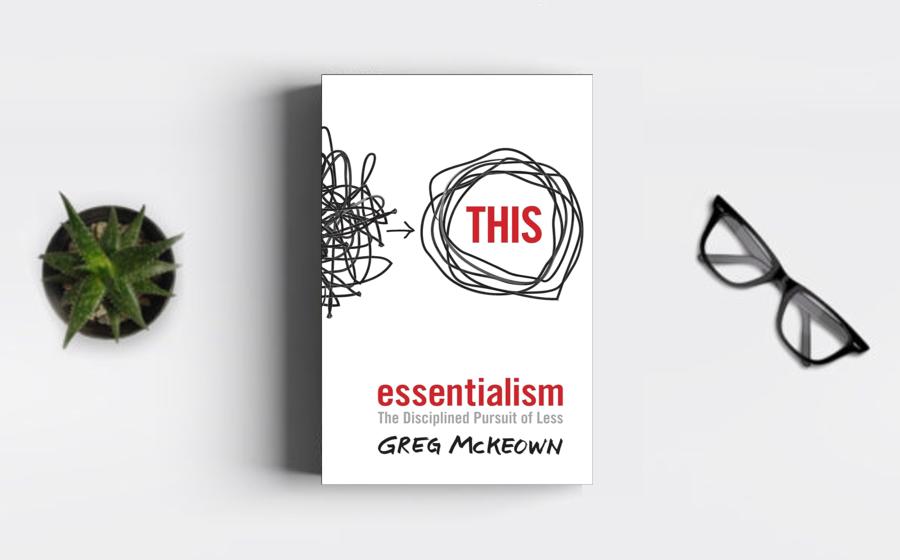"Essentialism: The Disciplined Pursuit of Less" by
Greg McKeown is a transformative exploration of the
philosophy of essentialism - a disciplined approach to
discerning what truly matters and eliminating the
non-essential. McKeown advocates for simplifying life by
focusing on the most meaningful pursuits, decluttering
one's priorities, and reclaiming the joy of deliberate
choices.
The central theme of "Essentialism"
challenges the pervasive belief that more is always
better. McKeown argues that the constant pursuit of
more, whether it be more tasks, commitments, or
possessions, often leads to overextension, burnout, and
a sense of unfulfillment. Essentialism, on the other
hand, is about deliberately choosing fewer but more
impactful activities, enabling individuals to channel
their energy into what truly matters.
One of the
key principles of essentialism is discerning between the
trivial many and the vital few. McKeown introduces the
concept of "the undisciplined pursuit of more," a
mindset that permeates modern society and undermines the
pursuit of a meaningful life. Essentialism involves
breaking free from this mindset, honing in on the
essentials, and embracing the freedom that comes with
consciously saying no to the non-essential.
The
book delves into the importance of establishing clear
criteria for decision-making. McKeown introduces the 90%
rule, suggesting that if a potential opportunity or task
doesn't rate at least a 9 out of 10 in terms of
alignment with one's goals and values, it should be
declined. This discerning approach empowers individuals
to make choices that align with their essential
priorities and contribute to their overall well-being.
Moreover, "Essentialism" explores the concept of
trade-offs and the necessity of saying no to even good
opportunities in order to make room for the best ones.
McKeown emphasizes that embracing trade-offs is a
fundamental aspect of essentialism and involves
recognizing that resources are finite. By willingly
choosing to forgo certain options, individuals can
allocate their time and energy to the pursuits that
offer the highest return on investment.
In terms
of inspiration, "Essentialism" motivates readers by
presenting a compelling case for the liberating power of
simplicity and intentional choices. McKeown's clear and
engaging writing style, combined with real-life examples
and practical insights, makes the book accessible to a
broad audience. The emphasis on reclaiming control over
one's time and priorities offers a refreshing
perspective on living a purposeful and fulfilling life.
The narrative is enriched by McKeown's own
experiences and challenges, creating a sense of
authenticity and relatability. By sharing personal
stories of navigating the complexities of modern life,
McKeown demonstrates that the pursuit of essentialism is
not only a theoretical concept but a lived experience.
This transparency fosters a sense of encouragement and
reassurance, inspiring readers to embark on their own
journey of simplifying and prioritizing.
Moreover, "Essentialism" addresses the myth of having it
all and the societal pressure to excel in every area of
life. McKeown challenges the belief that success
requires balancing an infinite number of commitments and
responsibilities. Essentialism involves acknowledging
that having it all is a fallacy and that true success
lies in deliberately choosing what truly matters and
excelling in those chosen areas.
The book
explores the impact of technology and the constant
bombardment of information on individuals' ability to
focus on the essential. McKeown introduces the concept
of the paradox of success, emphasizing that success
often leads to increased opportunities and distractions.
Essentialism involves cultivating the discipline to
filter out the noise, prioritize the essential, and
focus on what truly matters.
Furthermore,
"Essentialism" addresses the fear of missing out (FOMO)
and the societal pressure to be involved in everything.
McKeown argues that the fear of missing out is a natural
consequence of the undisciplined pursuit of more and the
inability to make trade-offs. Essentialism involves
embracing the joy of missing out (JOMO) by recognizing
the value of intentionally choosing what to miss in
order to fully embrace the things that matter most.
The book provides practical strategies for
implementing essentialism in daily life. McKeown
introduces the concept of routine, creating a structured
environment that minimizes decision fatigue and allows
individuals to focus on their essential priorities. By
establishing routines and rituals, individuals can
streamline their decision-making processes and create
space for what truly matters.
In addition,
"Essentialism" explores the importance of play and
relaxation in the pursuit of a meaningful life. McKeown
challenges the notion that constant busyness is a badge
of honor and advocates for the value of downtime and
rejuvenation. Essentialism involves recognizing the
significance of rest and play as essential components of
a well-balanced and fulfilling life.
The book
also addresses the role of collaboration and
communication in the pursuit of essentialism. McKeown
emphasizes the importance of clearly communicating
priorities and expectations to avoid spreading oneself
too thin. By fostering open communication and setting
boundaries, individuals can navigate the complexities of
work and relationships while staying true to their
essential priorities.
Moreover, "Essentialism"
explores the connection between mindfulness and
essentialism. McKeown introduces the concept of
discernment, the ability to distinguish between the
important and the trivial in the present moment.
Essentialism involves cultivating mindfulness to make
intentional choices and avoid being swept away by the
constant demands of daily life.
"Essentialism: The Disciplined Pursuit of Less" is an inspiring guide that challenges the prevailing culture of busyness and invites individuals to embrace the art of simplifying life. Greg McKeown's evidence-based insights, relatable anecdotes, and practical strategies offer readers a roadmap for decluttering priorities and achieving greater purpose and joy. By emphasizing the transformative power of intentional choices and the pursuit of the essential.






